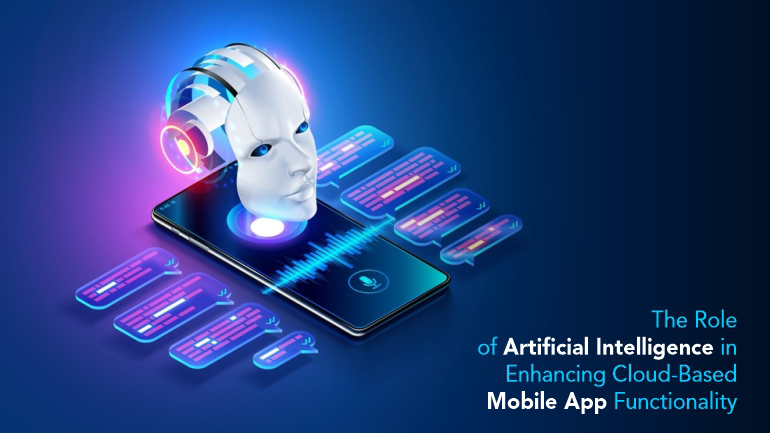The Role of Artificial Intelligence in Enhancing Cloud-Based Mobile App Functionality
Artificial Intelligence (AI) has taken the technological world by storm, transforming industries across the board. One area where AI has made significant strides is in enhancing the functionality of cloud-based mobile apps. In this article, we will explore the role of AI in improving and optimizing the performance of mobile applications, specifically those that rely on cloud infrastructure. With AI, developers can create smarter, more efficient mobile apps that offer a seamless user experience. here you go for mobile app development company in dubai.
The Power of AI in Mobile App Functionality
AI has the ability to analyze vast amounts of data and identify patterns, enabling mobile apps to learn and adapt to user behavior. By integrating AI algorithms into the cloud-based infrastructure, mobile app developers can significantly enhance app functionality.
Adaptive Personalization
AI-powered mobile apps can personalize the user experience by understanding individual preferences and adapting to their needs. By analyzing user data, such as browsing habits, purchase history, and location, AI algorithms can deliver tailored content and recommendations. This level of personalization ensures that users receive relevant information and services, ultimately improving user satisfaction and engagement.
Intelligent Automation
Another crucial aspect of AI in mobile app functionality is intelligent automation. AI algorithms can automate various tasks, such as data processing, image recognition, and language translation. By offloading these processes to the cloud, mobile apps can provide faster and more accurate results, saving valuable time and resources. This automation also allows developers to focus on creating innovative features and improving the overall user experience.
Enhanced Security
With the increasing number of cyber threats, security is a top concern for mobile app users. AI plays a critical role in enhancing app security by detecting and preventing unauthorized access and malicious activities. AI-powered mobile apps can analyze user behavior patterns to identify anomalies and flag potential security breaches. By leveraging cloud-based AI capabilities, developers can strengthen app security and protect user data, earning trust and loyalty.
AI and Cloud Collaboration
AI and cloud computing go hand in hand when it comes to enhancing mobile app functionality. Cloud infrastructure provides the necessary scalability and computational power to process vast amounts of data required for AI algorithms. Additionally, cloud-based services enable seamless integration of AI functionalities into mobile apps, without the need for complex on-device processing.
Scalability and Flexibility
The cloud offers unlimited scalability, allowing mobile apps to handle increasing workloads and user demands. AI algorithms can leverage this scalability to process immense amounts of data and deliver real-time insights to users. Furthermore, cloud-based AI models can be easily updated and improved without disrupting the app's functionality, ensuring that users always have access to the latest features and advancements.
Cost-Effectiveness
By utilizing cloud-based AI services, mobile app developers can significantly reduce costs. Instead of investing in dedicated hardware and infrastructure, developers can tap into cloud resources that offer AI capabilities on a pay-as-you-go basis. This flexibility allows developers to optimize costs according to their app's requirements, ensuring efficient usage of resources and providing affordable solutions to end-users.
The Future of AI-Enabled Cloud-Based Mobile Apps
As AI continues to advance, the role of AI in enhancing cloud-based mobile app functionality will only grow stronger. Some exciting developments on the horizon include:
Natural Language Processing
AI-powered mobile apps will become even more proficient in understanding and responding to natural language. Voice recognition and intelligent assistants will become the norm, revolutionizing how users engage with mobile apps and enabling a truly conversational experience.
Predictive Analytics
By leveraging AI algorithms, mobile apps will be able to analyze user data in real-time and make predictive recommendations. This level of personalization will anticipate user needs, providing tailored suggestions and enhancing user satisfaction.
Augmented Reality Integration
AI-powered cloud-based mobile apps will take advantage of augmented reality (AR) technology to provide immersive and interactive experiences. From gaming to virtual shopping, AR integration will transform how users engage with apps, opening new possibilities for innovation.
Conclusion
The role of Artificial Intelligence in enhancing cloud-based mobile app functionality cannot be underestimated. AI's ability to analyze data, automate processes, and provide personalized experiences elevates mobile apps to new heights. As AI and cloud computing continue to evolve, we can expect even greater advancements in mobile app functionality, forever changing the way we interact with our devices and the digital world around us. go for android app development agency in dubai.
FAQs
Q1.How does Artificial Intelligence enhance the personalization of user experiences in cloud-based mobile apps?
A: Artificial Intelligence analyzes user data, including browsing habits and location, to adapt and tailor content, ensuring a more personalized and engaging user experience.
Q2.What role does intelligent automation play in improving the functionality of mobile apps powered by AI?
A: Intelligent automation, facilitated by AI algorithms, allows mobile apps to automate tasks such as data processing and image recognition, leading to faster and more accurate results, ultimately improving the overall user experience.
Q3.How does AI contribute to the enhanced security of cloud-based mobile apps?
A: AI plays a crucial role in app security by detecting and preventing unauthorized access and malicious activities. It analyzes user behavior patterns to identify anomalies and enhance security measures, protecting user data and fostering trust.
Q4.Why is the collaboration between AI and cloud computing essential for mobile app functionality?
A: Cloud infrastructure provides the scalability and computational power needed for AI algorithms to process vast amounts of data. The collaboration enables seamless integration of AI functionalities into mobile apps without complex on-device processing.
Q5.In what ways does the cloud's scalability benefit mobile apps utilizing AI?
A:The cloud's unlimited scalability allows mobile apps to handle increasing workloads and user demands. AI algorithms leverage this scalability to process large amounts of data, deliver real-time insights, and ensure that users always have access to the latest features.
You May Also Like

Evolution and Impact of Motion Design in UI/UX
plays a pivotal role in creating engaging and intuitive user experiences. And within the realm of UI/UX design, motion design has emerged as a powerful tool to captivate and guide users through digital interfaces.

The Evolution of Voice User Interfaces: From ..
In today's digital age, AI and machine learning are revolutionizing the way businesses operate. One area where these technologies are making a profound impact is behavior marketing.
Categories
- Software Development
- Web Development
- iOS Development
- UI/UX Design
- Web Design
- Digital Marketing
- Graphic Design
- Android Development



